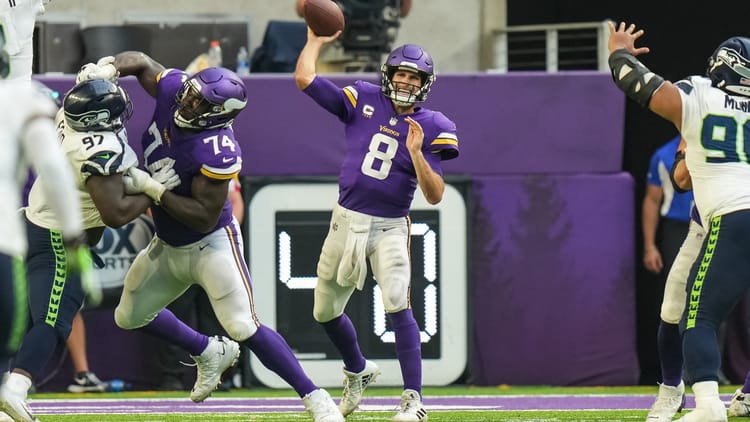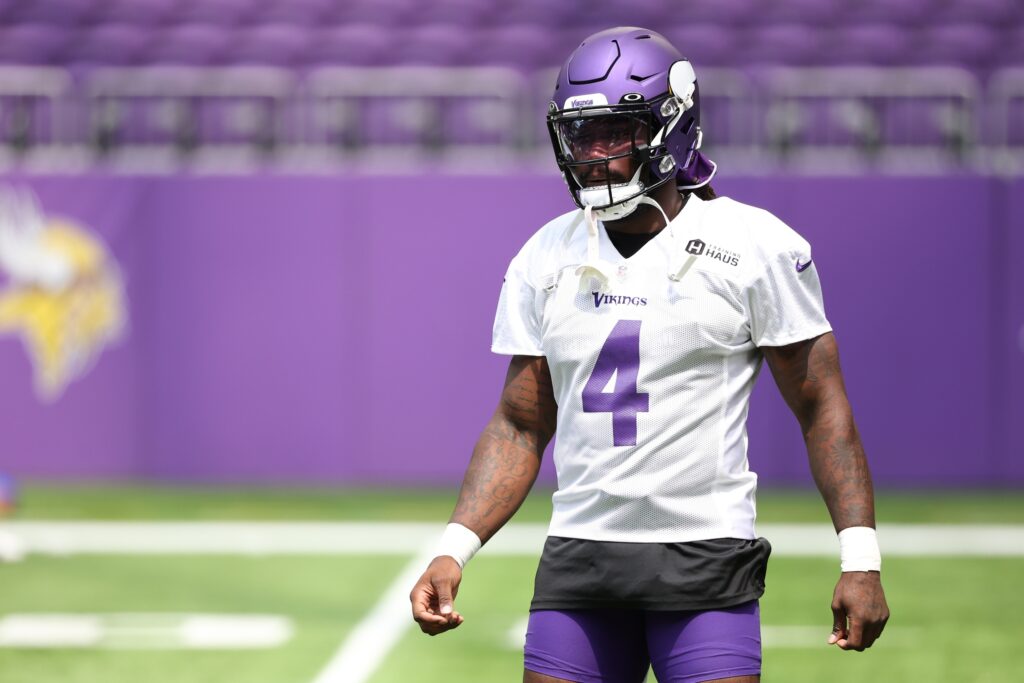The Great Eight Debate: Are Wins a QB Stat?

Forced to guess, I’d say most people think that wins aren’t a QB stat. I don’t have firm survey numbers to back up my position; I’m merely working off my sense from comments, quips, and opinions I see expressed online and in conversation. My argument that wins are and should be a QB stat, then, feels somewhat unpopular, though I’ll willingly admit that I may be misguided here. I’ll also admit that I go back and forth on this one. There are days when I lean toward seeing the W/L column as strictly a team statistic; it’s entirely possible that wins ought not be attributed to one player, even one as significant as the QB. For the sake of argument, though, I’ll do my best to defend the position that wins are a legitimate stat for a QB.
Editor’s Note: The other side to this debate will be published on Daily Norseman. Feel free to head over there to see the other side of things.
Before getting to the heart of the matter, consider two ideas that will hopefully pay dividends through the debate. First, wins as a QB stat should be looked at on a macro rather than micro level. So much can happen in a single game, so isolating one can be tricky. Over a sufficient amount of time, we can use wins as one of the statistical measures for a QB’s career, one that helps give a sense of the player’s abilities.
That leads to the second point: I’m not suggesting that QB wins is the perfect stat. Just as it would be foolish to, say, isolate interceptions as the only stat that matters, so too would be it misguided to prop up wins as preeminent in the world of QBs. If we isolated Brett Favre’s INTs, we’d think he was among the worst QBs to ever play. Wins are important, but they don’t have the whole truth cornered.
With that being said, a brief road map.
I’ll be supporting my argument with three main points, which are as follows: 1) The Argument from Statistics; 2) The Argument from Finances; 3) The Argument from History. These three arguments (at least to my small brain) are all interconnected, so hopefully they carry some cumulative weight. My understanding is that Mr. Ludford will be doing a deep dive using some advanced statistics. I won’t be going this route. Readers who enjoy advanced stats can likely find all kinds that contradict, complicate, and/or complement the arguments in this piece. I fully anticipate that Mr. Ludford will put forth a great case for why we shouldn’t ascribe wins to QBs, and it’s entirely possible we’re all persuaded by his case.
Alas, we must move onto the argument.
1) The Argument from Statistics
Football is a team sport. It’s this reality that powerfully stands in opposition to my argument that wins are a QB stat. How can a team outcome be ascribed to an individual player?
A counterpoint is that sports commonly attach wins to an individual position. Take baseball, for instance. Last season, Twins pitcher Bailey Ober had 3 wins and 3 losses. Does this mean he’s solely responsible for these outcomes? By no means, and yet a pitcher plays a massively important role in the outcome. The wise fan should still look to Ober’s ERA, WHIP, and several other statistical measures to get a fuller view. The fan should also see what the run support was like and watch the actual game to have a fuller sense of Ober’s performance. Even still, the W/L record remains.
We could pursue a similar line of reasoning with hockey. Currently, Minnesota Wild goaltender Cam Talbot has 16 wins on the year. Again, fans ought to consider this reality alongside his SV%, GAA, and several other stats (which is to say nothing of, you know, watching the games). How many goals has his team scored to support him? Did a defenseman have a brutal giveaway that made it essentially impossible for Talbot to make the save? These factors are all crucial, and yet we feel comfortable standing back and assessing a goalie’s W/L record as part of the general statistical analysis.
Furthermore, are any stats fully individual in a team sport?
We’re accustomed to discussing touchdown passes as belonging solely to the QB. Don’t forget, though, that there were offensive linemen who blocked, a receiver who caught the ball, a running back who picked up the blitz, and other receivers who drew attention away from the eventual touchdown scorer. The same could be said for other positions. There is no kicker field goal without a snap, hold, and blocking. There is no LB tackle without defensive linemen eating up blocks and other players shutting down other gaps.
In other words, there’s an awful lot of teamwork to bring an individual stat – such as a touchdown pass – to fruition.
Now, I’ll readily admit that this is comparing apples and oranges to a certain extent. A win is different from a touchdown pass, FG, or tackle insofar as it’s an outcome rather than a single play.
Even still, I’ll press the point. Other sports see no issue with putting a win onto a single player. In football, stats are inevitably influenced by others. The QB plays a massively important (though obviously not the only) role in the outcome in a game.
2) The Argument from Finances
In Matthew 6, Jesus offers a teaching about money. He implores His followers to invest their money in God’s Kingdom rather than mere earthly matters, explaining that “where your treasure is, there your heart will be also.” He goes on to insist that money can become someone’s god, the top priority in their life.
By this point, you may be asking yourself why we’ve taken this Bible detour. Well, it’s because Jesus’ words – whether you believe in Christianity or not – do tell us something about money and its importance in people’s lives.
Anyone who has followed the NFL for any amount of time knows that money reigns supreme. The decisions NFL teams make are the ones that move them towards more winning and therefore more profit. Quite often, those two things are bedfellows; more winning usually leads to more fan support, thus leading to more money.
So my theory is this: just follow the money and you’ll very quickly learn what someone – or, in this scenario, a team and/or league – values. The boatloads of money that get invested at QB suggests the position is indeed the most important in the sport.
In other words, there’s a reason why QBs get paid the most money. They’re the ones who are most important to a team’s ability to win on a consistent basis. Individual games can lead to wonkiness, and yet it’s the QB’s abilities (or, on the other end of things, lack thereof) that can sustain success over a long amount of time.
Hop over to Spotrac and see the largest contracts in the NFL. QBs are disproportionately represented toward the top.
It’s also worth remembering that the non-QBs who get toward the top of the list are there largely because of their ability to either allow the QB to thrive or stop a QB from thriving. Trent Williams is perhaps the league’s preeminent LT; his value to the 49ers largely stems from his ability to keep his QB upright (though he is a sensational run blocker). Aaron Donald, Khalil Mack, and Joey Bosa are toward the top because they can make life difficult for the QB. Being an incredible run defender doesn’t earn someone that kind of elite money.
Rather, it’s the QB alongside the players most responsible for protecting/hitting the QB who garner the most money. The suggestion from finances, then, is that the QB is the most important player on the field.
My suspicion is that the QB position is the one that most impacts a team’s success (again, think macro, not micro). A great QB can (though certainly not always) overcome a roster’s deficiencies in a manner that other positions can’t. The ability to throw the ball well can hide an OL’s flaws, help keep the offense on the field (and therefore make life easier for the defense), and help win the position battle by consistently moving the chains. I’d be surprised if the other preeminent positions – offensive tackle, pass rusher, corner – could have this same impact with the same consistency over a long stretch of time.
3) The Argument from History
I’ll keep this one shorter since it’s more subjective.
My last argument is largely a thought exercise. Before continuing to read, take a moment to think about the NFL’s best QBs to ever play. Try to be objective as you come up with a list of names. I did the same thing while prepping for this piece.
Are these all-time great QBs still great if they don’t have stellar win/loss records? When we think of the greatest QBs, we think of ones who won a lot, implicitly associating wins with the quarterback position.
The aforementioned search for the best QBs in league history led me to an article on NFL.com. The piece includes, in their estimation, the top-25 QBs in league history. Almost every single one of them finished their career with a healthy win/loss ratio.
Do we still see Tom Brady as the best ever if he wasn’t so completely spectacular at winning, especially in the biggest games? Probably not. We often define QBs – especially the great ones – by looking to their records.
Now, winning a Super Bowl need not be the final factor here. Dan Marino isn’t a lesser QB than Joe Flacco since the latter has a Lombardi and the former doesn’t. It’s worth noting, though, that Marino consistently won throughout his career, finishing with a 147-93 record.
So, the final component is that we often already use wins in our evaluation, and it would be difficult to do a QB evaluation without taking wins/losses into account.

Purple PTSD: Week 3 NFL Picks: The Vikings Bounce Back
Conclusion
There are times when the QB does nearly everything right and still loses; we saw this when Josh Allen lost to Kansas City last weekend. How can we fault a faultless player? A QB goes out and has an elite day on the field but is let down by his special teams, defense, and/or other players in the offense. Surely we can’t blame him for that outcome.
On the micro level, I believe that’s true. Over a sufficiently long amount of time, though, these things generally work themselves out. Plus, that line of reasoning is a two-way street. Just as there are games when a QB does everything right and still loses, so too are there games when a QB does everything wrong and still wins.
Wins are by no means a perfect measure of a QB’s performance. Rather, they’re merely one measure of the kind of career a player has had. The most important thing for an NFL football team is getting the win, and QB is (at least according to conventional wisdom and the way team’s spend their money) the most important position. To my mind, then, it makes some sense to think of wins as both a team and QB stat.
[brid autoplay=”true” video=”945524″ player=”26281″ title=”WATCH%205%20Tennessee%20Titans%20QB%20options%20to%20replace%20Ryan%20Tannehill” duration=”127″ description=”The way the season ended for the Tennessee Titans is hard to swallow. Despite the defense racking up nine sacks, enough to tie an NFL playoff record, Ryan Tannehill, Derrick Henry, and Co. will be watching the Super Bowl from home.” uploaddate=”2022-01-24″ thumbnailurl=”https://cdn.brid.tv/live/partners/17660/snapshot/945458_s_1643053997928.png” contentUrl=”https://cdn.brid.tv/live/partners/17660/streaming/945458/945458.m3u8″]

